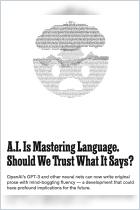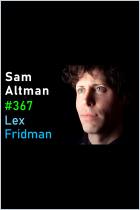加入 getAbstract 阅读摘要

加入 getAbstract 阅读摘要
Ted Chiang
ChatGPT Is a Blurry JPEG of the Web
OpenAl’s chatbot offers paraphrases, whereas Google offers quotes. Which do we prefer?
The New Yorker, 2023
看看什么内容?
Large language models provide blurry AI answers because of their dependence on “lossy” compression.
Recommendation
Today’s large language models operate by scouring massive data inputs, much of it from the web. The sheer magnitude of that training material requires researchers to employ compression algorithms that contain inherent flaws. The results are entertaining and often useful, but a far cry from human creative prose. Author Ted Chiang compares OpenAI’s ChatGPT to a “blurry JPEG” of the internet, rather than a reliable responder.
Summary
About the Author
Ted Chiang is an award-winning author of science fiction. In 2016, the title story from his first collection, Stories of Your Life and Others, was adapted into the film Arrival. He lives in Bellevue, Washington, where he works as a freelance technical writer.



















Comment on this summary